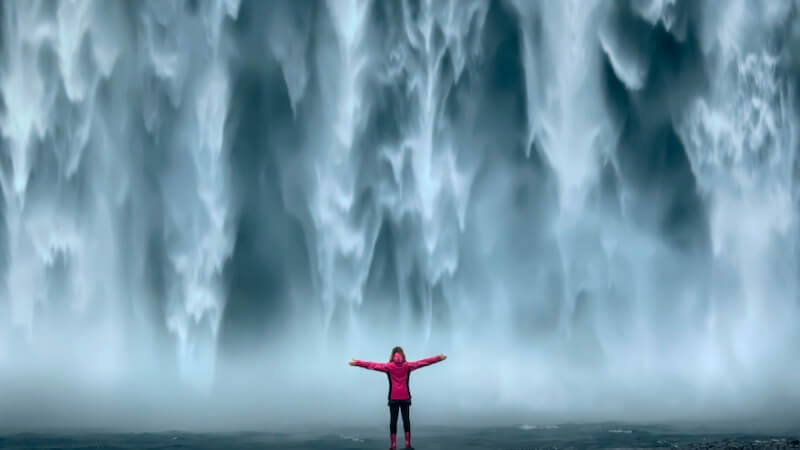
We have all felt awe. It’s vast, it’s minuscule, and it’s everywhere — if we let ourselves feel its presence and impact.
Witnessing sunset at Montmartre with my best friend, toasting her birthday, gazing out over Paris. That time I visited the Reclining Buddha in Bangkok. When I led 500 people in a yoga practice next to the New York Library and people sang. When my dad walked me down the aisle. Awe is a recurring experience in my life.
Feeling and experiencing awe is sometimes obvious, but other times, what brings us awe is small, sometimes so tiny, we wouldn’t notice if it weren’t for an actual practice of awe.
Dacher Keltner says awe should be a practice. He’s the Founding Director of the Greater Good Science Center at U.C. Berkeley. A psychology professor, he concentrates his work on the social functions of emotion, such as, “the appeasement functions of embarrassment” or “the commitment-enhancing properties of love and desire.”
Keltner also studies the concept of awe and its ability to let us transcend ourselves while supporting healing and well-being. In advance of his upcoming workshop at Esalen — Awe and Wonder: An Exploration Through Science, Contemplation, and Narrative — and for World Mental Health Day, October 10, Keltner also offers a question: How can we fuel the greater good of our future society — with awe?
Christine Chen: How would you describe or define awe?
Dacher Keltner: Awe is a brief emotion, and it is the feeling you have when you encounter vast things you don’t understand.
CC: How do we experience awe?
DK: You might feel it in your body in tears, in goosebumps, and a little warmth in your chest, or chills running up the back of your scalp.
CC: What are the benefits of awe?
DK: We’re kinder, more compassionate, more collaborative. The immune system. Awe calms down the inflammation response. Almost every problem we have today… awe is a cheap, non-ideological solution to the problems of our times. It quiets down the nagging self and opens you up to wonder — wow, how could that possibly exist — and it makes us more altruistic. Awe tends to make us more forgiving, sharing…
CC: When do we experience awe?
DK: In our research, we found people are experiencing awe two to three times a week. When they’re walking their child to school, sitting at lunch in the sun, or they encounter something moving on YouTube, they watch a great movie. Awe is around us quite powerfully, and what that tells us is there are simple things we can do. We can take a moment to think about a person who moves us to tears — we can think about their life. We can get outside, and there are a lot of contemplative awe practices — awe walks, music, art…
CC: In these times, how can awe help us become better versions of ourselves?
DK: It challenges our frame of reference… it transcends our understanding. You look at a microscopic cell, you see a tiny hand, and it says look — there is more than your understanding of the world.
CC: How do we practice awe in this moment, apply it to the present moment, and create a more meaningful future?
DK: Take those moments of awe that sustained us during the pandemic, and think about how to build them. Out of the pandemic, I’m more interested in how I’m going to find awe, walking with a friend to work, rather than flying somewhere and white-water rafting down some rapids. I think there’s a real profound opportunity here, with a bit of reflection and, to use your word, intentional redesign of what makes us happy in life.
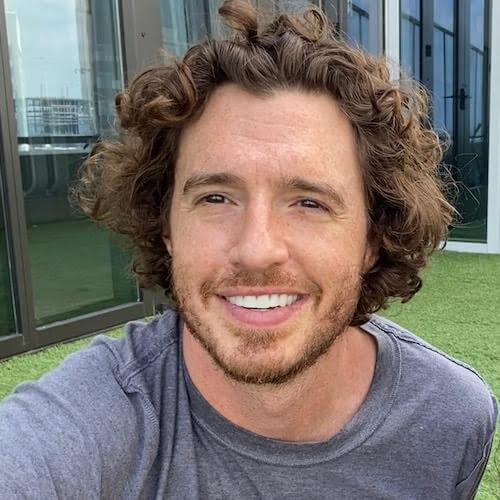
“Remembering to be as self compassionate as I can and praying to the divine that we're all a part of.”
–Aaron
“Prayer, reading, meditation, walking.”
–Karen
“Erratically — which is an ongoing stream of practice to find peace.”
–Charles
“Try on a daily basis to be kind to myself and to realize that making mistakes is a part of the human condition. Learning from our mistakes is a journey. But it starts with compassion and caring. First for oneself.”
–Steve
“Physically: aerobic exercise, volleyball, ice hockey, cycling, sailing. Emotionally: unfortunately I have to work to ‘not care’ about people or situations which may end painfully. Along the lines of ‘attachment is the source of suffering’, so best to avoid it or limit its scope. Sad though because it could also be the source of great joy. Is it worth the risk?“
–Rainer
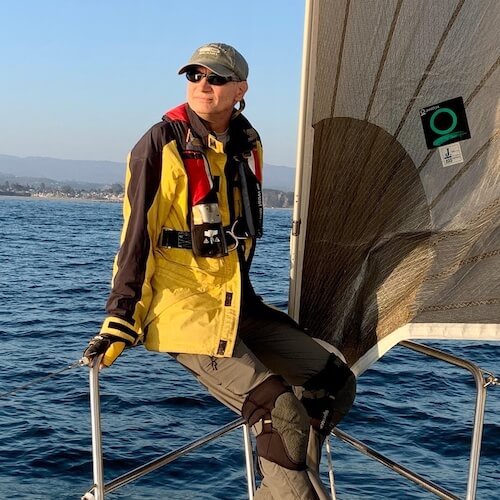

“It's time for my heart to be nurtured on one level yet contained on another. To go easy on me and to allow my feelings to be validated, not judged harshly. On the other hand, to let the heart rule with equanimity and not lead the mind and body around like a master.”
–Suzanne
“I spend time thinking of everything I am grateful for, and I try to develop my ability to express compassion for myself and others without reservation. I take time to do the things I need to do to keep myself healthy and happy. This includes taking experiential workshops, fostering relationships, and participating within groups which have a similar interest to become a more compassionate and fulfilled being.“
–Peter
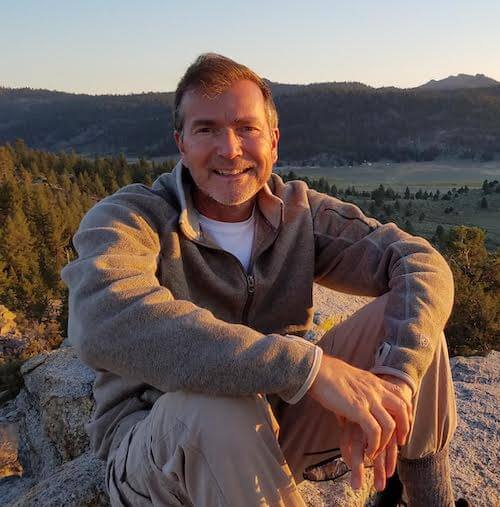
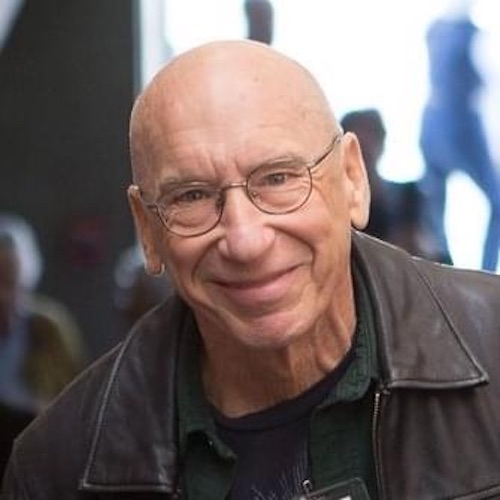
“Self-forgiveness for my own judgments. And oh yeah, coming to Esalen.”
–David B.
“Hmm, this is a tough one! I guess I take care of my heart through fostering relationships with people I feel connected to. Spending quality time with them (whether we're on the phone, through messages/letters, on Zoom, or in-person). Being there for them, listening to them, sharing what's going on with me, my struggles and my successes... like we do in the Esalen weekly Friends of Esalen Zoom sessions!”
–Lori

“I remind myself in many ways of the fact that " Love is all there is!" LOVE is the prize and this one precious life is the stage we get to learn our lessons. I get out into nature, hike, camp, river kayak, fly fish, garden, I create, I dance (not enough!), and I remain grateful for each day, each breath, each moment. Being in the moment, awake, and remembering the gift of life and my feeling of gratitude for all of creation.”
–Steven
“My physical heart by limiting stress and eating a heart-healthy diet. My emotional heart by staying in love with the world and by knowing that all disappointment and loss will pass.“
–David Z.
Today, September 29, is World Heart Day. Strike up a conversation with your own heart and as you feel comfortable, encourage others to do the same. As part of our own transformations and self-care, we sometimes ask for others to illuminate and enliven our hearts or speak our love language.
What if we could do this for ourselves too, even if just for today… or to start a heart practice, forever?
You can sign up for Dacher Keltner and Molly McNeil’s upcoming workshop at Esalen, Awe and Wonder: An Exploration Through Science, Contemplation, and Narrative, November 5-7, 2021.
Christine Chen is a two-time Emmy winning journalist, best-selling author, California native, and senior teacher of yoga and Ayurveda.

We have all felt awe. It’s vast, it’s minuscule, and it’s everywhere — if we let ourselves feel its presence and impact.
Witnessing sunset at Montmartre with my best friend, toasting her birthday, gazing out over Paris. That time I visited the Reclining Buddha in Bangkok. When I led 500 people in a yoga practice next to the New York Library and people sang. When my dad walked me down the aisle. Awe is a recurring experience in my life.
Feeling and experiencing awe is sometimes obvious, but other times, what brings us awe is small, sometimes so tiny, we wouldn’t notice if it weren’t for an actual practice of awe.
Dacher Keltner says awe should be a practice. He’s the Founding Director of the Greater Good Science Center at U.C. Berkeley. A psychology professor, he concentrates his work on the social functions of emotion, such as, “the appeasement functions of embarrassment” or “the commitment-enhancing properties of love and desire.”
Keltner also studies the concept of awe and its ability to let us transcend ourselves while supporting healing and well-being. In advance of his upcoming workshop at Esalen — Awe and Wonder: An Exploration Through Science, Contemplation, and Narrative — and for World Mental Health Day, October 10, Keltner also offers a question: How can we fuel the greater good of our future society — with awe?
Christine Chen: How would you describe or define awe?
Dacher Keltner: Awe is a brief emotion, and it is the feeling you have when you encounter vast things you don’t understand.
CC: How do we experience awe?
DK: You might feel it in your body in tears, in goosebumps, and a little warmth in your chest, or chills running up the back of your scalp.
CC: What are the benefits of awe?
DK: We’re kinder, more compassionate, more collaborative. The immune system. Awe calms down the inflammation response. Almost every problem we have today… awe is a cheap, non-ideological solution to the problems of our times. It quiets down the nagging self and opens you up to wonder — wow, how could that possibly exist — and it makes us more altruistic. Awe tends to make us more forgiving, sharing…
CC: When do we experience awe?
DK: In our research, we found people are experiencing awe two to three times a week. When they’re walking their child to school, sitting at lunch in the sun, or they encounter something moving on YouTube, they watch a great movie. Awe is around us quite powerfully, and what that tells us is there are simple things we can do. We can take a moment to think about a person who moves us to tears — we can think about their life. We can get outside, and there are a lot of contemplative awe practices — awe walks, music, art…
CC: In these times, how can awe help us become better versions of ourselves?
DK: It challenges our frame of reference… it transcends our understanding. You look at a microscopic cell, you see a tiny hand, and it says look — there is more than your understanding of the world.
CC: How do we practice awe in this moment, apply it to the present moment, and create a more meaningful future?
DK: Take those moments of awe that sustained us during the pandemic, and think about how to build them. Out of the pandemic, I’m more interested in how I’m going to find awe, walking with a friend to work, rather than flying somewhere and white-water rafting down some rapids. I think there’s a real profound opportunity here, with a bit of reflection and, to use your word, intentional redesign of what makes us happy in life.

“Remembering to be as self compassionate as I can and praying to the divine that we're all a part of.”
–Aaron
“Prayer, reading, meditation, walking.”
–Karen
“Erratically — which is an ongoing stream of practice to find peace.”
–Charles
“Try on a daily basis to be kind to myself and to realize that making mistakes is a part of the human condition. Learning from our mistakes is a journey. But it starts with compassion and caring. First for oneself.”
–Steve
“Physically: aerobic exercise, volleyball, ice hockey, cycling, sailing. Emotionally: unfortunately I have to work to ‘not care’ about people or situations which may end painfully. Along the lines of ‘attachment is the source of suffering’, so best to avoid it or limit its scope. Sad though because it could also be the source of great joy. Is it worth the risk?“
–Rainer


“It's time for my heart to be nurtured on one level yet contained on another. To go easy on me and to allow my feelings to be validated, not judged harshly. On the other hand, to let the heart rule with equanimity and not lead the mind and body around like a master.”
–Suzanne
“I spend time thinking of everything I am grateful for, and I try to develop my ability to express compassion for myself and others without reservation. I take time to do the things I need to do to keep myself healthy and happy. This includes taking experiential workshops, fostering relationships, and participating within groups which have a similar interest to become a more compassionate and fulfilled being.“
–Peter


“Self-forgiveness for my own judgments. And oh yeah, coming to Esalen.”
–David B.
“Hmm, this is a tough one! I guess I take care of my heart through fostering relationships with people I feel connected to. Spending quality time with them (whether we're on the phone, through messages/letters, on Zoom, or in-person). Being there for them, listening to them, sharing what's going on with me, my struggles and my successes... like we do in the Esalen weekly Friends of Esalen Zoom sessions!”
–Lori

“I remind myself in many ways of the fact that " Love is all there is!" LOVE is the prize and this one precious life is the stage we get to learn our lessons. I get out into nature, hike, camp, river kayak, fly fish, garden, I create, I dance (not enough!), and I remain grateful for each day, each breath, each moment. Being in the moment, awake, and remembering the gift of life and my feeling of gratitude for all of creation.”
–Steven
“My physical heart by limiting stress and eating a heart-healthy diet. My emotional heart by staying in love with the world and by knowing that all disappointment and loss will pass.“
–David Z.
Today, September 29, is World Heart Day. Strike up a conversation with your own heart and as you feel comfortable, encourage others to do the same. As part of our own transformations and self-care, we sometimes ask for others to illuminate and enliven our hearts or speak our love language.
What if we could do this for ourselves too, even if just for today… or to start a heart practice, forever?
You can sign up for Dacher Keltner and Molly McNeil’s upcoming workshop at Esalen, Awe and Wonder: An Exploration Through Science, Contemplation, and Narrative, November 5-7, 2021.

We have all felt awe. It’s vast, it’s minuscule, and it’s everywhere — if we let ourselves feel its presence and impact.
Witnessing sunset at Montmartre with my best friend, toasting her birthday, gazing out over Paris. That time I visited the Reclining Buddha in Bangkok. When I led 500 people in a yoga practice next to the New York Library and people sang. When my dad walked me down the aisle. Awe is a recurring experience in my life.
Feeling and experiencing awe is sometimes obvious, but other times, what brings us awe is small, sometimes so tiny, we wouldn’t notice if it weren’t for an actual practice of awe.
Dacher Keltner says awe should be a practice. He’s the Founding Director of the Greater Good Science Center at U.C. Berkeley. A psychology professor, he concentrates his work on the social functions of emotion, such as, “the appeasement functions of embarrassment” or “the commitment-enhancing properties of love and desire.”
Keltner also studies the concept of awe and its ability to let us transcend ourselves while supporting healing and well-being. In advance of his upcoming workshop at Esalen — Awe and Wonder: An Exploration Through Science, Contemplation, and Narrative — and for World Mental Health Day, October 10, Keltner also offers a question: How can we fuel the greater good of our future society — with awe?
Christine Chen: How would you describe or define awe?
Dacher Keltner: Awe is a brief emotion, and it is the feeling you have when you encounter vast things you don’t understand.
CC: How do we experience awe?
DK: You might feel it in your body in tears, in goosebumps, and a little warmth in your chest, or chills running up the back of your scalp.
CC: What are the benefits of awe?
DK: We’re kinder, more compassionate, more collaborative. The immune system. Awe calms down the inflammation response. Almost every problem we have today… awe is a cheap, non-ideological solution to the problems of our times. It quiets down the nagging self and opens you up to wonder — wow, how could that possibly exist — and it makes us more altruistic. Awe tends to make us more forgiving, sharing…
CC: When do we experience awe?
DK: In our research, we found people are experiencing awe two to three times a week. When they’re walking their child to school, sitting at lunch in the sun, or they encounter something moving on YouTube, they watch a great movie. Awe is around us quite powerfully, and what that tells us is there are simple things we can do. We can take a moment to think about a person who moves us to tears — we can think about their life. We can get outside, and there are a lot of contemplative awe practices — awe walks, music, art…
CC: In these times, how can awe help us become better versions of ourselves?
DK: It challenges our frame of reference… it transcends our understanding. You look at a microscopic cell, you see a tiny hand, and it says look — there is more than your understanding of the world.
CC: How do we practice awe in this moment, apply it to the present moment, and create a more meaningful future?
DK: Take those moments of awe that sustained us during the pandemic, and think about how to build them. Out of the pandemic, I’m more interested in how I’m going to find awe, walking with a friend to work, rather than flying somewhere and white-water rafting down some rapids. I think there’s a real profound opportunity here, with a bit of reflection and, to use your word, intentional redesign of what makes us happy in life.

“Remembering to be as self compassionate as I can and praying to the divine that we're all a part of.”
–Aaron
“Prayer, reading, meditation, walking.”
–Karen
“Erratically — which is an ongoing stream of practice to find peace.”
–Charles
“Try on a daily basis to be kind to myself and to realize that making mistakes is a part of the human condition. Learning from our mistakes is a journey. But it starts with compassion and caring. First for oneself.”
–Steve
“Physically: aerobic exercise, volleyball, ice hockey, cycling, sailing. Emotionally: unfortunately I have to work to ‘not care’ about people or situations which may end painfully. Along the lines of ‘attachment is the source of suffering’, so best to avoid it or limit its scope. Sad though because it could also be the source of great joy. Is it worth the risk?“
–Rainer


“It's time for my heart to be nurtured on one level yet contained on another. To go easy on me and to allow my feelings to be validated, not judged harshly. On the other hand, to let the heart rule with equanimity and not lead the mind and body around like a master.”
–Suzanne
“I spend time thinking of everything I am grateful for, and I try to develop my ability to express compassion for myself and others without reservation. I take time to do the things I need to do to keep myself healthy and happy. This includes taking experiential workshops, fostering relationships, and participating within groups which have a similar interest to become a more compassionate and fulfilled being.“
–Peter


“Self-forgiveness for my own judgments. And oh yeah, coming to Esalen.”
–David B.
“Hmm, this is a tough one! I guess I take care of my heart through fostering relationships with people I feel connected to. Spending quality time with them (whether we're on the phone, through messages/letters, on Zoom, or in-person). Being there for them, listening to them, sharing what's going on with me, my struggles and my successes... like we do in the Esalen weekly Friends of Esalen Zoom sessions!”
–Lori

“I remind myself in many ways of the fact that " Love is all there is!" LOVE is the prize and this one precious life is the stage we get to learn our lessons. I get out into nature, hike, camp, river kayak, fly fish, garden, I create, I dance (not enough!), and I remain grateful for each day, each breath, each moment. Being in the moment, awake, and remembering the gift of life and my feeling of gratitude for all of creation.”
–Steven
“My physical heart by limiting stress and eating a heart-healthy diet. My emotional heart by staying in love with the world and by knowing that all disappointment and loss will pass.“
–David Z.
Today, September 29, is World Heart Day. Strike up a conversation with your own heart and as you feel comfortable, encourage others to do the same. As part of our own transformations and self-care, we sometimes ask for others to illuminate and enliven our hearts or speak our love language.
What if we could do this for ourselves too, even if just for today… or to start a heart practice, forever?
You can sign up for Dacher Keltner and Molly McNeil’s upcoming workshop at Esalen, Awe and Wonder: An Exploration Through Science, Contemplation, and Narrative, November 5-7, 2021.
Christine Chen is a two-time Emmy winning journalist, best-selling author, California native, and senior teacher of yoga and Ayurveda.